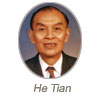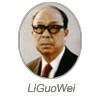CURRICULUM VITAE OF WU RUKANG
Abstract
Wu Rukang (Woo Ju-Kang), noted Chinese paleo-anthropologist, was born on February 19,1916 in Wujin, Jiangsu Province, China. After graduated from the Biology Department, National Central University in 1940, he joined the Institute of History and Philology, Academia Sinica and began to do research work in the anthropology section of that Institute. During the period of six years, he wrote three scientific papers, two published in Chinese journal and one in USA. 1946 he went to the Department of Anatomy, School of Medicine, Washington University in St. Louis, Missouri, USA to pursue advanced studies. 1947 he received his master degree and got the position of research fellow in the Anatomy Department. In 1949, upon receiving his Ph. D. degree, he returned quickly to China. He was appointed Professor of Anatomy in Dalian Medical College.
1952 Wu happened to meet Professor Yang Zhongjian who later became the director of the Institute of Vertebrate Paleontology and Paleo- anthropology. Yang told Wu that Zhoukoudian had resumed excavation and had found several teeth and some limb bones and asked Wu to study them. Then Wu joined Yang's Institute.
Since the founding of the People's Republic of China in 1949, capital construction started nationwide, such as road building, mining etc revealed or indicated many fossil sites. Thus provided important hominid fossils of different periods, such as Homo erectus of Lantern and Hexian, Homo sapiens of Ding Cun, Maba, Ziyang and Jianping. Wu made in-depth studies of all these fossils and his work laid the foundations of Chinese paleo-anthropology.
Based on the study of Peking Man fossils, he proposed the concept that in the transition period from ape to human the unbalanced development of physical features.
He changed the fossil specimens found in Lufeng, Yunnan first assigned as Ramapithecus to Lufengpithecus, a new genus.
His monograph “Mandibles and Teeth of Gigantopithecus" was considered as a classic work in Chinese paleo-anthrolopology .
He also made great contributions on the study of the physique of modern Chinese people and initiates a new course, the Neo-anthropology.






